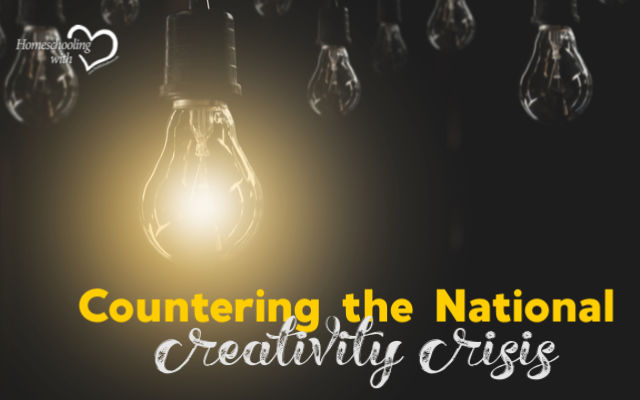Countering the National Creativity Crisis


What is our most important role, pursuit, or vocation in life? To some, it’s to provide for their family. Others may say to enjoy life, or to make a lasting impression. To the Christian, the answer may be to love God and love our neighbor.
While all these answers are correct, to the homeschool parent, the complete education of their children is paramount. That includes values, faith, and a well-rounded education, including the finer arts. Since it’s mostly homeschoolers who are reading this, I’m not writing anything surprising, but I want to encourage you to focus on CREATIVITY as part of your curriculum.
Creativity is at the center of everything we do. It makes us unique and provides balance in life. It is the engine that drives invention, the catalyst for ideas, and the foundation of a healthy education, business and nation. Unfortunately, the United States is in a Creativity Crisis and has been for over 20 years. After analyzing 300,000 results from the Torrance Tests for Creative Thinking, researcher Kyung Hee Kim discovered creativity scores have been steadily dropping (along with IQ scores) since 1990. The scores of younger children in America, from kindergarten through sixth grade, show the most serious decline.
While the potential consequences are sweeping, the critical necessity of human ingenuity is undisputed: Children who offered more creative ideas on Torrance’s tasks grew up to be entrepreneurs, inventors, doctors, college presidents, authors, diplomats, and software developers.
Middle school is a critical age, and the tipping point for children. During this time, students are still inquisitive, ask questions, are independent thinkers, and are willing to take risks. From Stewart’s research, 5-year-olds retain 98% of their creative ability. By age 10, their creativity scores drop to 30%; by age 15, the scores plummet to 12% (George Land, Breakpoint and Beyond). Most of this is caused by an outdated educational system founded on an industrial model that focuses on conformity, ignores the arts, and pushes irrelevant testing. Capturing this age by introducing creativity is vital. Our entire educational system is predicated on a questionable hierarchy that places conformity above creativity, and the consequences are that many talented and imaginative students never discover their gifts or their potential.
Why is Creativity Important?
- Creativity is one of three top skills by 2020 (WEFR 2015).
- IBM Survey of 1,500 CEOs: Creativity is the #1 leadership quality of the future.
- 94% of hiring managers consider creativity when hiring job candidates (Adobe).
- Creative applicants are preferred 5-to-1.
- The Creative Industries boast faster job growth and slower job loss.
- By 2030, AI will replace 90% of accounting jobs, 60% of banking jobs, 50% of medical and engineering jobs — but technology cannot replace creativity.

Can one person make a difference? Absolutely! A homeschool parent with the right tools is such a tremendous influence. We are helping, too, by encouraging students, teachers, and parents with inspiring Creativity Presentations and bringing creativity back into the classroom, one student and one school at a time.
I urge you to encourage and inspire your students to believe their dreams are possible.
One of the most important parts of creativity is its connection to emotions and the visceral parts of the brain. Neuroimaging experiments demonstrate that we use the very same neural systems to feel our bodies as to feel our relationships and our creative inspiration. To develop ideas that can be considered creative, the brain must be both stable and flexible at the same time, a balancing act performed every second of every day.
When researchers asked children what learning aspects made them feel most creative, the answer was the freedom of not choosing right and wrong answers. Indeed, freedom to explore and practice without a specific goal in mind is a key element in the development of creative competence. We must cultivate these behaviors by introducing them to students, explaining that the more they do it, the better they will become at it.
Students (and teachers) often stop trying because they are afraid of making mistakes that may be embarrassing. However, if we don’t take chances and make mistakes along the way, we fail to learn, let alone do anything unusual or innovative. In creative problem-solving, a mistake is an experiment to learn from, valuable information that offers guidance about what to try next. Research suggests creative people make more mistakes than others, but they also make more attempts than most people. They have more ideas, come up with more possibilities, and generate more schemes. They win some, they lose some, and eventually, they triumph.
And we’ve achieved our goal.
“Creativity is not an option, it’s an absolute necessity.” – Sir Ken Robinson
C. R. Stewart is author of Britfield & the Lost Crown, a middle grade/YA adventure novel released Aug. 15. The book transports the reader from the smoldering crags of Yorkshire, through the heart of England, and finally to the magnificent shores of Dover.
Creating an interactive world of mystery and adventure, culture and education, this is the first in a five-part Britfield series. Stewart said a movie is planned for each book.
Britfield is more than a book; it’s a Movement in Creativity and Education. Stewart has embarked on a 250+ school National Book Tour to cultivate creativity. Stewart has established himself as an expert in the value of creativity in education, and is a sought-after media guest.
He received a Bachelor of Arts in British Literature and European History from Brown University, did post-graduate work in business and writing at Harvard University,and earned an MBA from Boston College.
More information:
http://bit.ly/BritfieldTrailer
facebook.com/OfficialBritfield











































